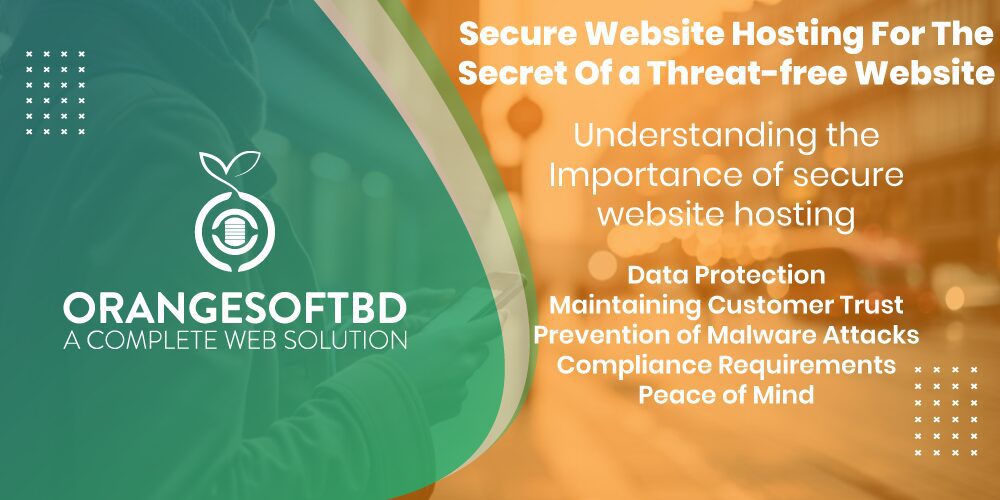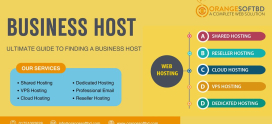
Secure Website Hosting For The Secret Of a Threat-free Website
In an era where cyber threats loom large, securing your website is paramount. Choosing a web hosting service that prioritizes security is crucial for safeguarding sensitive data and maintaining trust with your users.
A secure website hosting provider employs robust measures such as encryption protocols, firewalls, and regular security updates to fortify your website against potential threats. With features like SSL certificates and DDoS protection, they ensure data integrity and mitigate the risk of malicious attacks.
Moreover, a reliable hosting service offers proactive monitoring and quick response to any security breaches, minimizing downtime and potential damage.
By investing in a secure website hosting solution, you not only protect your website but also uphold your reputation and foster a safe online environment for your visitors.
Understanding the Importance of secure website hosting
Secure website hosting is crucial for several reasons, especially in today’s digital landscape where cybersecurity threats are prevalent. Here are some key reasons why secure website hosting is important:
Data Protection: secure website hosting ensures that your website’s data, including customer information, transactions, and sensitive files, are protected from unauthorized access, theft, or manipulation.
Maintaining Customer Trust: A breach in security can lead to a loss of trust and reputation damage. Secure hosting helps maintain customer confidence and loyalty by demonstrating your commitment to protecting their information.
Prevention of Malware Attacks: Secure hosting providers typically implement measures to prevent malware attacks, such as regular security audits, malware scanning, and firewalls. This helps to minimize the risk of your website being compromised by malicious software.
Compliance Requirements: Many industries have regulatory requirements regarding data security and privacy. Secure hosting can help you comply with these regulations by providing features such as data encryption, access controls, and audit trails.
Peace of Mind: Knowing that your website is hosted securely gives you peace of mind and allows you to focus on other aspects of your business without constantly worrying about potential security threats.
secure website hosting is essential for protecting your data, maintaining customer trust, preventing downtime, complying with regulations, improving search engine rankings, and ensuring overall peace of mind for you and your users.
Choosing the Right secure website hosting Provider
Choosing the right secure website hosting provider is crucial for ensuring the safety and reliability of your website. Here are some factors to consider when selecting a secure website hosting provider:
- Security Features: Look for hosting providers that offer robust security features such as SSL/TLS encryption, firewalls, malware scanning and removal, DDoS protection, intrusion detection systems, regular security updates, and backups.
- Reputation and Reliability: Research the reputation and track record of the hosting provider. Look for reviews and testimonials from other users to gauge their reliability, uptime performance, and customer support quality.
- Data Center Security: Inquire about the physical security measures in place at the hosting provider’s data centers. This includes access controls, surveillance systems, environmental controls, and redundancy for power and network connectivity to prevent downtime.
- Support and Response Time: Check the responsiveness and expertise of the hosting provider’s customer support team, especially regarding security-related inquiries or incidents. Look for providers that offer 24/7 support and quick resolution times for security issues.
- Cost-Effectiveness: While security is paramount, consider the cost-effectiveness of the hosting provider’s services in relation to the security features and resources provided. Compare pricing plans and features across multiple providers to find the best balance between security & affordability.
By carefully evaluating these factors and conducting thorough research, you can choose a secure website hosting provider that meets your specific security requirements and provides a solid foundation for your website’s success.
Implementing Best Practices for Threat-Free Websites
Implementing best practices for maintaining a threat-free website involves a combination of proactive measures to prevent security breaches and reactive strategies to mitigate risks and respond to incidents. Here are some essential practices to follow:
- Keep Software Updated: Regularly update your website’s content management system (CMS), plugins, themes, and any other software to patch known vulnerabilities and reduce the risk of exploitation by attackers.
- Use Strong Authentication: Enforce strong password policies for user accounts and consider implementing multi-factor authentication (MFA) to add an extra layer of security against unauthorized access.
- Regular Security Audits and Scans: Conduct regular security audits and vulnerability scans to identify and address security weaknesses in your website’s infrastructure, code, and configurations.
- Backup Data Regularly: Implement automated backups of your website’s data and files, including databases and configuration settings, to ensure that you can restore functionality quickly in case of data loss or ransomware attacks.
- Monitor and Log Activity: Set up monitoring and logging mechanisms to track user activity, system events, and security-related incidents, enabling timely detection and response to potential threats.
Best practices and maintaining a proactive approach to security, you can minimize the risk of security breaches and keep your website safe from threats. Regularly reassess and update your security measures to adapt to evolving threats and protect your website’s integrity and reputation.
Future Trends in secure website hosting
Predicting future trends in secure website hosting involves considering emerging technologies, evolving threats, and changing user expectations. Here are some potential future trends in secure website hosting:
- Increased Emphasis on Cloud Security: There will be a growing emphasis on cloud security in web hosting. Hosting providers will invest in robust cloud security measures and access management & security automation, to protect hosted data and applications.
- Focus on Container Security: With the increasing adoption of containerization technologies like Docker and Kubernetes, securing containerized environments will become a priority for hosting providers.
- Rise of Serverless Computing Security: Serverless computing eliminates the need for managing server infrastructure, but it introduces new security challenges. Hosting providers will develop specialized security measures for serverless environments and continuous monitoring.
- Enhanced Data Privacy and Compliance Measures: With the growing focus on data privacy regulations such as GDPR, CCPA, and others, hosting providers will implement enhanced data protection measures to ensure compliance.
- Focus on User-Centric Security: Hosting providers will prioritize user-centric security measures to protect against identity theft, credential stuffing, and other attacks targeting users. This may involve implementing stronger authentication methods.
Hosting providers that prioritize security and embrace emerging technologies and best practices will be well-positioned to meet the evolving needs of their customers in an increasingly digital and interconnected world.
Conclusion
Secure website hosting plays a critical role in safeguarding websites, data, and user interactions from a myriad of cybersecurity threats. As technology continues to advance and the digital landscape evolves, the importance of secure website hosting will only grow.
Hosting providers must remain vigilant and adaptable to emerging threats, continuously investing in security measures, threat intelligence, and collaboration efforts to stay ahead of adversaries.
Ultimately, the future of secure website hosting lies in innovation, collaboration, and a steadfast commitment to protecting the integrity, confidentiality, and availability of online assets.
By prioritizing security and embracing evolving technologies and best practices, businesses can establish a solid foundation for building trust with their customers and ensuring the long-term success of their online ventures.













